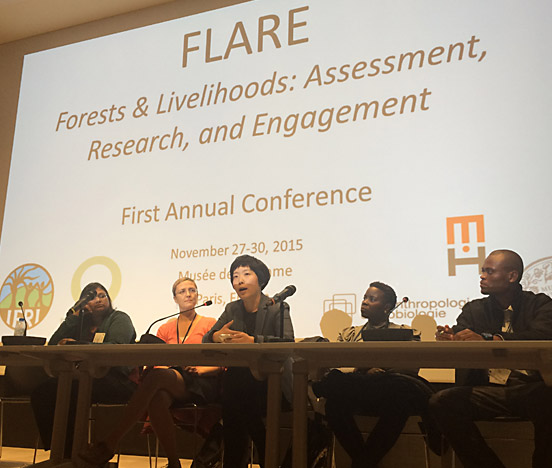IFRI is developing a Community of Practice, Forests & Livelihoods: Assessment, Research, and Engagement (FLARE) network which aims to advance the state of knowledge regarding forest-based livelihoods. By bringing together representatives of key stakeholders – donor organizations, environmental and social NGOs, development agencies, and research organizations – we will build on and leverage existing expertise and efforts to share and advance cutting edge knowledge and conversations on forest-based livelihoods. Ultimately, the goals of FLARE are to generate usable information and methodologies for collecting it; develop, promote and share the findings of the group; and implement such tools, knowledge, and methods to improve monitoring efforts and, ultimately, the efficacy of forest-dependent livelihood interventions around the world. Together with the Program on Forests of the World Bank (PROFOR) and the Musée de l’Homme Research Group on Social and Natural Evolution, IFRI will launch the FLARE network with an exciting conference event in Paris, just prior to the Conference of Parties on Climate Change (COP). The conference will be held at the Musée de l’Homme in Paris, France.
Conference Aims
Reducing poverty and increasing adaptive capacity relying on forests is difficult to implement and monitor, but it can be done – successful examples around the world exist at both community and household levels, and both the social and natural science methods behind these challenges are at a watershed. The first annual FLARE conference will advance cutting edge knowledge on forest-based livelihoods, laying the groundwork to further develop tools, methods, and indicators to assess how, where, and why interventions function best to protect forests, reduce terrestrial GHG emissions, and improve the lives of forest-dependent peoples within the larger landscape context. Through a series of oral presentations, speed talks, posters, and workshops, we will create a strategy to catalyze analyses of existing large-scale forest, census, and household datasets; generate functional analytic frameworks, indicators, and methodological products to assess outcomes of forest sector interventions; identify areas of needed research; and promote the broader adoption of these products by researchers, practitioners, and policy makers alike.
Six Conference Themes
Governance and Landscapes: Empirical or theoretical work focusing on resource governance and development interventions that have an impact on lifespans, livelihoods, and conservation in and across landscapes. Potential areas of interest include empirical studies on the impacts of interventions (e.g. protected areas, certification, and community-based management, decentralization, rights and representation, landscape restoration), context specific (for instance, related to endemism) vs. more national or global scale interventions, and the development and use of key governance indicators.
Agricultural Commodities: Contributions should address how the expansion or intensification of agricultural commodity production relates to forest cover and distribution on the landscape. Empirical or theoretical work that examines the effect of ‘zero deforestation’ policies and how commodity agriculture affects deforestation and reforestation rates and livelihood outcomes are welcome, particularly those that employ a landscape approach to assess linkages between forests and their surrounding agricultural landscapes, and the varied trade and subsistence activities that shape them.
Social and Biological Aspects of Forest Dependence: Empirical or theoretical work on the social aspects of forest-based livelihoods at the individual, household, community or population level, including the role of gender in managing and benefiting from resources, household vulnerability and adaptation strategies, disease ecology and epidemiological trends, and the effectiveness of different strategies to empower forest-dependent people.
Impact Evaluations: This theme has a methodological focus. Contributions addressing the challenges related to 1) counterfactual analyses; 2) merging datasets with different resolutions; 3) selecting indicators to assess impacts; 4) establishing causal relationships between forests investments, other types of interventions and livelihood outcomes; 5) combining qualitative and quantitative methods; and other methodological tools are welcome.
Pathways to Prosperity: We invite case studies that highlight the role that forests can play in lifting people out of poverty (e.g. scaling up of small and medium forest enterprises, community-private sector partnerships). Studies at local or regional levels where forest reliance has improved people’s lives and livelihoods while conserving the natural resource base, as well as theoretical contributions, are encouraged.
Climate: Empirical or theoretical contributions that assess the linkages between climate and forests will be appropriate for this panel, and important for shaping discussions at the UNFCCC COP21 meeting. Potential areas of interest are climate and climate policies as drivers of forest change, and the importance of forests as part of emerging policy frames for carbon development, climate-smart agriculture, monitoring and prevention of deadly infectious disease, climate adaptation, or other broad approaches to human security within and beyond forests.
Conference Materials
Conference summary report
Conference participant feedback report
Presentation and paper submission guidelines: Oral and lightning presentations
Presentation and paper submission guidelines: Posters
Participant list and presenter abstracts
Conference program ‘At a Glance’
Full conference program
Full papers
Lunch options list and Google Map
Location & Accommodation Information
Workshop descriptions

